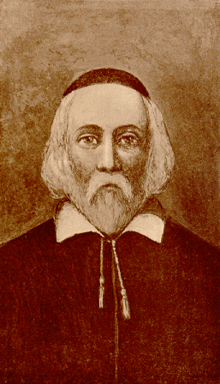William Brewster (Pilgrim)
| William Brewster | |
|---|---|

Published in The Romantic Story of the Mayflower Pilgrims: And its place in the life of to-day, 1911
|
|
| Born | 1568 Scrooby, Nottinghamshire |
| Died | April 10, 1644 (aged 76) Duxbury, Plymouth Colony |
| Nationality | English subject |
| Occupation | Postmaster and English teacher of Scrooby, preacher of Plymouth |
| Known for | Pilgrim |
| Spouse(s) | Mary Brewster |
| Children |
|
| Parent(s) | William Brewster Mary Smythe |
William Brewster (1568 – 10 April 1644) was an English official and Mayflower passenger in 1620. In Plymouth Colony, by virtue of his education and existing stature with those immigrating from the Netherlands, Brewster, a separatist, became a regular preacher and the leader of the community.
William Brewster was born in 1568, most probably in Scrooby, Nottinghamshire, England. He was the son of William Brewster and Mary (Smythe; Simkinson) and he had a number of half-siblings. His paternal grandparents were William Brewster (1510–1558), and Maud Mann (1513–1558). His maternal grandfather was William Smythe (1505–1560).
He studied briefly at Peterhouse, Cambridge, before entering the service of William Davison in 1584. Brewster was the only Pilgrim with political and diplomatic experience. With his mentor in prison, Brewster had returned home to Scrooby for a time, where he took up his father’s former position as postmaster. Cambridge was a centre of thought concerning religious reformism, but Brewster had spent time in the Netherlands in connection with Davison's work, giving him opportunity to hear and see more of reformed religion. While, earlier in the 16th century, reformers had hoped to amend the Anglican church, by the end of it, many were looking toward splitting from it. (See Brownist.)
Restrictions and pressures applied by the authorities convinced the congregation of a need to immigrate to the more sympathetic atmosphere of Holland, but leaving England without permission was illegal at the time, so that departure was a complex matter. On its first attempt, in 1607, the group was arrested at Scotia Creek, but in 1608, Brewster and others were successful in leaving from The Humber. In 1609, he was selected as ruling elder of the congregation.
William lived near St. Peter's church (Dutch: Pieterskerk) in Leiden with his wife and children. He taught English to Leiden University students and was also a printer of religious pamphlets. His son, Jonathan, was a ribbonweaver. William was chosen as assistant and later as an elder to Pastor John Robinson. He was still an elder when he travelled to Plymouth Colony in 1620.
...
Wikipedia
